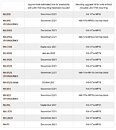
Noctua's Next-Gen NF-A14 Fans Use Liquid Crystal Polymer Impellers
Noctua is preparing a major design update for its NF-A series fans. The company is preparing its next-generation fans with the new Sterrox liquid-crystal polymer material. LCP provides superior structural stability for the blades at high RPM, allowing them to maintain their correct profile, and maximizing their airflow and noise characteristics; in comparison to impellers made from conventional thermoplastics such as LDPE, PBT, PVC, ABS, etc. LCPs also feature very high strength-to-weight ratio, which is what makes another popular kind of LCP, Kevlar, the material of choice for anti-ballistic armors.
For case fans, the impeller has such structural strength to hold its shape, that Noctua has reduced clearance between the impeller and the bore of the frame to under 1 mm, which helps guide all of the fan's airflow axially. Other design innovations to the impeller include channels that accelerate airflow toward the edges of the fan blades, and a stepped inlet structure toward the impeller hub that creates a pressure-differential, and guides the air better toward the impeller blades. The fan hub is metal reinforced, and the motor uses an SSO2 fan bearing. The frame of the fan, has integrated anti-vibration pads. Noctua plans to launch the next-gen 140 mm A-series case fan in Q1-2024.
For case fans, the impeller has such structural strength to hold its shape, that Noctua has reduced clearance between the impeller and the bore of the frame to under 1 mm, which helps guide all of the fan's airflow axially. Other design innovations to the impeller include channels that accelerate airflow toward the edges of the fan blades, and a stepped inlet structure toward the impeller hub that creates a pressure-differential, and guides the air better toward the impeller blades. The fan hub is metal reinforced, and the motor uses an SSO2 fan bearing. The frame of the fan, has integrated anti-vibration pads. Noctua plans to launch the next-gen 140 mm A-series case fan in Q1-2024.













































































